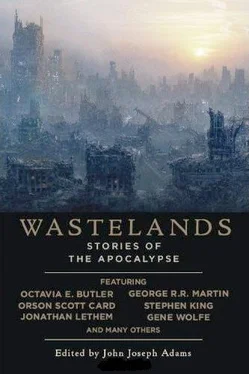Eventually the sociologists remembered older models of deprivation and discrimination and isolation from the larger culture: Jewish shtetls. French Huguenots. Amish farmers. Self-sufficient models, stagnant but uncollapsed. And while they were remembering, we held goods lotteries, and took on apprentices, and rationed depository food according to who needed it, and replaced our broken-down furniture with other broken-down furniture, and got married and bore children. We paid no taxes, fought no wars, wielded no votes, provided no drama. After a while-a long while—the visitors stopped coming. Even the sociologists.
But here stands this young man, without a sani-suit, smiling from brown eyes under thick dark hair and taking my hand. He doesn’t wince when he touches the ropes of disease. Nor does he appear to be cataloguing the kitchen furniture for later recording: three chairs, one donated imitation Queen Anne and one Inside genuine Joe Kleinschmidt; the table; the wood stove; the sparkling new Oriental lacquered cupboard; plastic sink with hand pump connected to the reservoir pipe from Outside; woodbox with donated wood stamped "Gift of Boise-Cascade"; two eager and intelligent and loving young girls he had better not try to patronize as diseased freaks. It has been a long time, but I remember.
"Hello, Mrs. Pratt. I’m Tom McHabe. Thank you for agreeing to talk to me."
I nod. "What are we going to talk about, Mr. McHabe? Are you a journalist?"
"No. I’m a doctor."
I didn’t expect that. Nor do I expect the sudden strain that flashes across his face before it’s lost in another smile. Although it is natural enough that strain should be there: Having come Inside, of course, he can never leave. I wonder where he picked up the disease. No other new cases have been admitted to our colony for as long as I could remember. Had they been taken, for some Outside political reason, to one of the other colonies instead?
McHabe says, "I don’t have the disease, Mrs. Pratt."
"Then why on earth—"
"I’m writing a paper on the progress of the disease in long-established colony residents. I have to do that from Inside, of course," he says, and immediately I know he is lying. Rachel and Jennie, of course, do not. They sit one on each side of him like eager birds, listening.
"And how will you get this paper out once it’s written?" I said. "Short-wave radio. Colleagues are expecting it," but he doesn’t quite meet my eyes.
"And this paper is worth permanent internment?"
"How rapidly did your case of the disease progress?" he says, not answering my question. He looks at my face and hands and forearms, an objective and professional scrutiny that makes me decide at least one part of his story is true. He is a doctor.
"Any pain in the infected areas?"
"None."
"Any functional disability or decreased activity as a result of the disease?" Rachel and Jennie look slightly puzzled; he’s testing me to see if I understand the terminology.
"None."
"Any change in appearance over the last few years in the first skin areas to be affected? Changes in colour or tissue density or size of the thickened ridges?"
"None."
"Any other kinds of changes I haven’t thought to mention?"
"None."
He nods and rocks back on his heels. He’s cool, for someone who is going to develop non-dysfunctional ropes of disease himself. I wait to see if he’s going to tell me why he’s really here. The silence lengthens. Finally McHabe says, "You were a CPA," at the same time that Rachel says, "Anyone want a glass of ’ade?"
McHabe accepts gladly. The two girls, relieved to be in motion, busy themselves pumping cold water, crushing canned peaches, mixing the ’ade in a brown plastic pitcher with a deep wart on one side where it once touched the hot stove.
"Yes," I say to McHabe, "I was a CPA. What about it?"
"They’re outlawed now."
"CPAs? Why? Staunch pillars of the establishment," I say, and realize how long it’s been since I used words like that. They taste metallic, like old tin.
"Not anymore. IRS does all tax computations and sends every household a customized bill. The calculations on how they reach your particular customized figure is classified. To prevent foreign enemies from guessing at revenue available for defense."
"Ah."
"My uncle was a CPA."
"What is he now?"
"Not a CPA," McHabe says. He doesn’t smile. Jennie hands glasses of ’ade to me and then to McHabe, and then he does smile. Jennie drops her lashes and a little colour steals into her cheeks. Something moves behind McHabe’s eyes. But it’s not like Peter; not at all like Peter.
I glance at Rachel. She doesn’t seem to have noticed anything. She isn’t jealous, or worried, or hurt. I relax a little.
#
McHabe says to me. "You also Published that artical."
"How do you happen to know that?"
Again he doesn’t answer me. "It’s an unusual combination of abilities, accounting and history writing."
"I suppose so," I say, without interest. It was so long ago. Rachel says to McHabe, "Can I ask you something?"
"Sure."
"Outside, do you have medicines that will cure wood of termites?"
Her face is deadly serious. McHabe doesn’t grin, and I admit-reluctantly-that he is likable. He answers her courteously. "We don’t cure the wood, we do away with the termites. The best way is to build with wood saturated with creosote, a chemical they don’t like, so that they don’t get into the wood in the first place. But there must be chemicals that will kill them after they’re already there. I’ll ask around and try to bring you something on my next trip Inside."
His next trip Inside. He drops this bombshell as if easy passage In and Out were a given. Rachel’s and Jennie’s eyes grow wide; they both look at me. McHabe does, too, and I see that his look is a cool scrutiny, an appraisal of my reaction. He expects me to ask for details, or maybe even-it’s been a long time since I thought in these terms, and it’s an effort-to become angry at him for lying. But I don’t know whether or not he’s lying, and at any rate, what does it matter? A few people from Outside coming into the colony-how could it affect us? There won’t be large immigration, and no emigration at all.
I say quietly, "Why are you really here, Dr. McHabe?"
"I told you, Mrs. Pratt. To measure the progress of the disease." I say nothing. He adds, "Maybe you’d like to hear more about how it is now Outside."
"Not especially."
"Why not?"
I shrug. "They leave us alone."
He weighs me with his eyes. Jennie says timidly, "I’d like to hear more about Outside." Before Rachel can add "Me, too," the door flings violently open and Mamie backs into the room, screaming into the hall behind her.
"And don’t ever come back! If you think I’d ever let you touch me again after screwing that…that…1 hope she’s got a diseased twat and you get it on your—" She sees McHabe and breaks off, her whole body jerking in rage. A soft answer from the hall, the words unintelligible from my chair by the fire, makes her gasp and turn even redder. She slams the door, bursts into tears, and runs into her bedroom, slamming that door as well.
Rachel stands up. "Let me, honey," I say, but before I can rise-my arthritis is much better-Rachel disappears into her mother’s room. The kitchen rings with embarrassed silence.
Tom McHabe rises to leave. "Sit down, Doctor," I say, hoping, I think, that if he remains Mamie will restrain her hysterics-maybe-and Rachel will emerge sooner from her mother’s room.
McHabe looks undecided. Then Jennie says, "Yes, please stay. And would you tell us —" I see her awkwardness, her desire to not sound stupid "—about how people do Outside?"
Читать дальше












